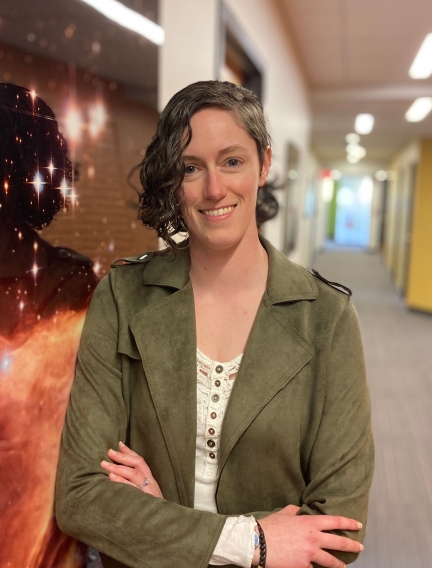McKinley Brumback
Assistant Professor of Physics

- Office
- McCardell Bicen Hall 514
- Tel
- (802) 443-3429
- mbrumback@middlebury.edu
- Office Hours
- Spring 2027: Mondays 10 AM - 12 PM, Thursdays 1 PM - 2:30 PM, Fridays 10 AM - 11 AM, Or by appointment
Courses Taught
PHYS 0111
Current
Waves, Optics & Thermodynamics
Course Description
Oscillatory Motion, Waves, Optics, and Thermodynamics
This calculus-based course covers oscillations, wave motion, sound, geometrical optics, physical optics, and thermodynamics. Other physics topics may be added at the discretion of the instructor. Lab experiments will explore these topics and develop skills in experimentation and data analysis. (PHYS 0108 or 0109 and MATH 0121) 3 hrs. lect./3 hrs. lab.
Terms Taught
Requirements
PHYS 0155
Introduction to the Universe
Course Description
An Introduction to the Universe
Our universe comprises billions of galaxies in a rapidly expanding fabric. How did it begin? Will it expand forever, or how may it end? How do the stars that compose the galaxies evolve from their births in clouds of gas, through the tranquility of middle age, to their often violent deaths? How can scientists even hope to answer such cosmic questions from our vantage point on a small planet, orbiting a very ordinary star? Are there other planets, orbiting other stars, where intelligent beings may be pondering similar issues? This introductory astronomy course, designed for nonscience majors, will explore these and other questions. Students will also become familiar with the night sky, both as part of our natural environment and as a scientific resource, through independent observations and sessions at the College Observatory. The approach requires no college-level mathematics, but students should expect to do quantitative calculations using scientific notation and occasionally to use elementary high-school algebra. 3 hrs. lect./1 hrs.lab.
Terms Taught
Requirements
PHYS 0330
Analytical Mechanics
Course Description
Analytical Mechanics
An intermediate-level course in the kinematics and dynamics of particles and rigid body motion. The topics will include: analysis and application of Newton's law of mechanics; the concepts of work, energy, and power; energy conservation; momentum and momentum conservation; torque, angular momentum, and angular momentum conservation; oscillatory motion; and central-force motion. Lagrange's and Hamilton's formulations of classical mechanics will be introduced with emphasis placed on developing problem-solving strategies and techniques. (PHYS 212 or PHYS 0216) 3 hrs. lect.
Terms Taught
PHYS 0345
Current
High Energy Astrophysics
Course Description
High Energy Astrophysics
The study of high energy astrophysics offers insights into some of the most extreme environments and phenomena found in the Universe, from ultra-strong magnetic fields to the event horizons of black holes. In this course we will explore an introduction to the physics of high energy emission and absorption processes in the context of white dwarfs, neutron stars, black holes, supernovae, and more. We will link the theory of these emission mechanisms to data through X-ray data analysis projects that will introduce students to the spectroscopic and timing analyses used by high energy astrophysicists. (PHYS 0214).
Terms Taught
PHYS 0500
Current
Upcoming
Ind. Study & Special Topic
Course Description
Independent Study and Special Topics
(Approval required)
Terms Taught
PHYS 0705
Upcoming
Senior Thesis
Course Description
Senior Thesis
For a student who has completed PHYS 0704 and, by agreement with his or her advisor, is continuing the senior project as a senior thesis. (PHYS 0704 and approval required)
Terms Taught
PHYS 1010
Cosmic Beginnings and Endings
Course Description
Cosmic Beginnings and Endings
The study of astronomy is driven by questions about the origins and ultimate fate of objects in the cosmos. Astronomical time scales often far exceed human ones, meaning that we rarely get to watch astronomy happen in the same way that we can watch experiments in a traditional physics laboratory. Astronomers can only observe objects as they are and must develop theories and models about how they came to be and how they might cease to be. In this course, we will explore scientific models about the cosmic beginnings and endings of some of the most fundamental objects in the Universe (and of the Universe itself). Topics will include the Big Bang, the ultimate fate of the Universe, the formation of the first stars and galaxies, the births and deaths of stars, and the search for life in the Universe. The course has no prerequisites, but students should expect to solve quantitative problems using algebra and trigonometry and to read scientific articles regarding recent astronomical discoveries.
Terms Taught
Requirements
